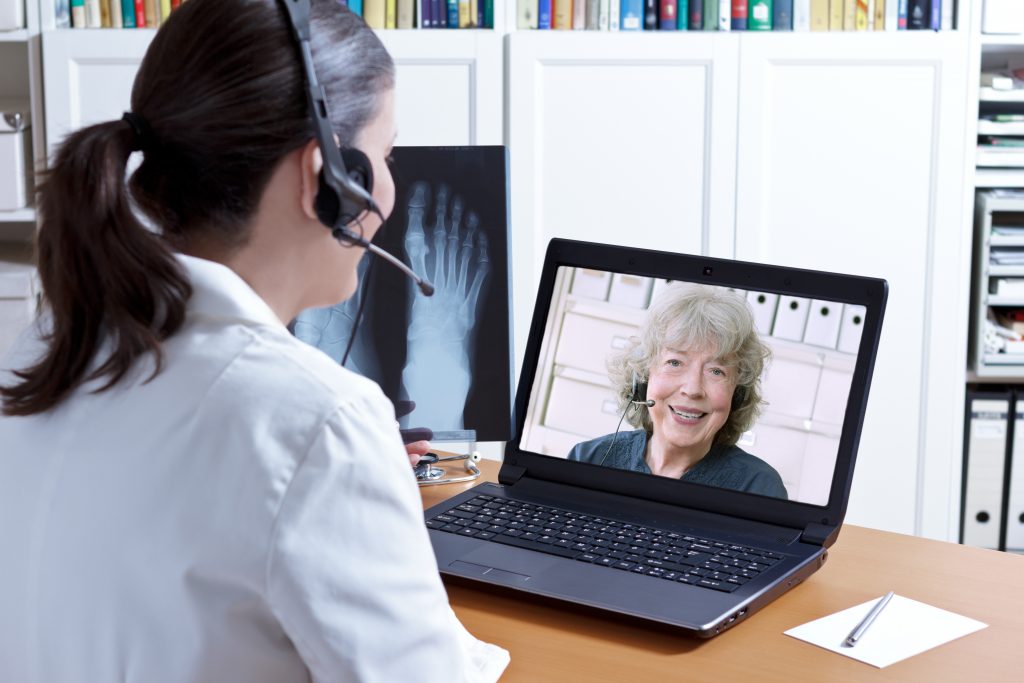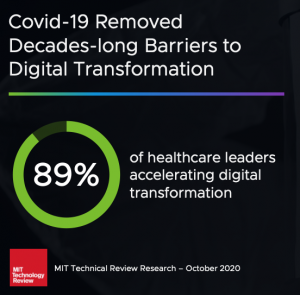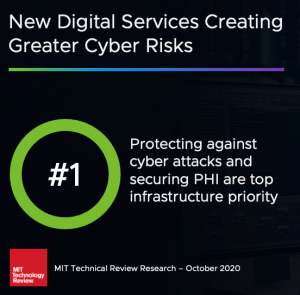VMware Healthcare blog MIT, January 2021, Jens Koegler, healthcare industry director EMEA
Though COVID has impacted every aspect of our lives, it’s impossible not to be drawn to the healthcare sector when thinking about the real, unrelenting pressures. The mere mention of the pandemic conjures up images or everything from scientists in hazmat suits to exhausted nurses and wards so busy it makes the historical A&E saturday night scenario look like a quiet GP waiting room.
But beyond all of that, and when we are inevitably through this harrowing period in history, we are likely to look back on 2020/21 as an inflection point for the sector. The pandemic has catapulted use of technology in a way that simply would not have been possible otherwise, evidenced in the clinical trials process for the vaccine.
COVID required to catalyse change
Healthcare systems across Europe have been heading towards digital transformation for the last decade but it has been a slow process. For example, the German Government introduced a new category of care delivery with the Digital Health Care Act, passed at the end of 2019, which introduced digital health applications as a means of providing care and of treating patients and as an instrument for physicians and psychotherapists. But it has taken the COVID-19 pandemic to catalyse the adoption of many digital healthcare applications such as telehealth and remote monitoring.
Germany’s contact tracking app, Corona Warn, has seen about 17.5 million downloads. The UK equivalent has been downloaded by over 19 million people. While we wish many more people would embrace the technology and contribute to faster contact tracking, this is still a stark result given the privacy concerns that continue to exist. Even more impressive is that 99% of GP practices now offer video consultations, up from 3% in early 2020. This speed, scale and seismic shift to technology in healthcare is a subject covered in our latest report with MIT Technology Review Insights: ‘Digital acceleration in the time of coronavirus’ where the healthcare specific insights are also summarised here.

The world’s biggest technology test case

A full 89% of healthcare leaders in the MIT Technology Review study are accelerating their digital transformation. This is to ensure the sector is equipped for the challenges of today while enabling them to become future-ready. What we have seen is the world’s biggest test case for technology within the healthcare sector – one that technologists have been calling for for some time – that has been passed with flying colours.
Almost all healthcare respondents (98%) say they hope to continue to invest in the adaptable technologies required to achieve digital transformation. Almost half (44%) anticipate increases as a result of the pandemic. While this is pleasing to see, technology never has been – or will be – about throwing money at the problem. Indeed, what is equally as important is how technology can help healthcare organisations optimise infrastructure to gain sufficient efficiencies that free up budget for digital innovation. The MIT study found more than half (58%) of healthcare organisations surveyed cited efficiency as key to success, expecting to allocate more than 25% of their IT budgets to infrastructure efficiency, particularly in automation (40%) and adopting a multi-cloud strategy (38%).
Agility, visibility & flexibility
The MIT Technology Review study reveals that modernising applications and cloud adoption go hand in hand. Legacy healthcare application development and delivery models are costly and ill-equipped to support cloud-native and other modern apps so it should come as no surprise to see that 39% of healthcare respondents have accelerated adoption of a cloud-based platform to support modern application development as a result of the pandemic. This is a number that will continue to rise because a growing number of cloud services are now available to power applications that can improve patient engagement (e.g. scheduling), and boost caregiver and staff productivity (e.g. business billing and human resources apps).

While the advent of cloud technology will usher in some major changes to healthcare, one unfortunate consistency is the threat of cybercrime. Global organisations saw a 148% spike in ransomware attacks early in the pandemic and as a result, 52% of healthcare leaders indicate they are allocating a “significant” share of their IT budgets to security and threat management. Future ready healthcare organisations recognise that growing telehealth practices and distributed workforces widen potential attack surfaces and have moved to strengthen their security postures with zero-trust, least-privilege policies and controls across on-premises, cloud, and endpoint devices.
While telehealth practices have increased significantly, filling a much-needed gap in serving healthy populations. A key challenge for business and IT leaders around digital experience is centered on providing the physical equipment necessary to be productive remotely (55%). Those with the most flexible and employee-friendly digital platforms were best positioned for success. Collaborative tools and platforms such as the digital workspace unifying device management and identity are becoming essential to care providers, telehealth practices, and serving a host of new distributed workers as IT enables real-time patient-caregiver engagement and information sharing while allowing users to choose their preferred platforms—all keys to business agility.
Better care for patients
Healthcare organisations that can achieve all this will reach something of a panacea – the ability to possess a digital foundation supporting any cloud, any app, and any device. It will enable them to better respond to change, improve operational efficiency and ultimately, deliver better care for patients.
You can see the MIT Technology Review Insights report in full here. Or, for more information on how VMware can help in your digital transformation journey or recovery from the pandemic, please visit us here.
Social Kit

- Check out our healthcare report with MIT Technology Review Insights: ‘Digital acceleration in the time of coronavirus to learn about the speed, scale and seismic shift to technology in healthcare
- Delivering better patient care, adapting to change and improving efficiency. Check out our healthcare report with MIT Technology Review Insights: ‘Digital acceleration in the time of coronavirus to learn more.
- Will we to look back on 2020 as an inflection point for healthcare? The use of technology has been catapulted so download our healthcare report with MIT Technology Review Insights: ‘Digital acceleration in the time of coronavirus to learn how.
Facebook/LinkedIn
- 89% of healthcare leaders are accelerating their digital transformation. Find out what can be learnt from healthcare delivery in 2020 to become future-ready in our healthcare report: ‘Digital acceleration in the time of coronavirus








